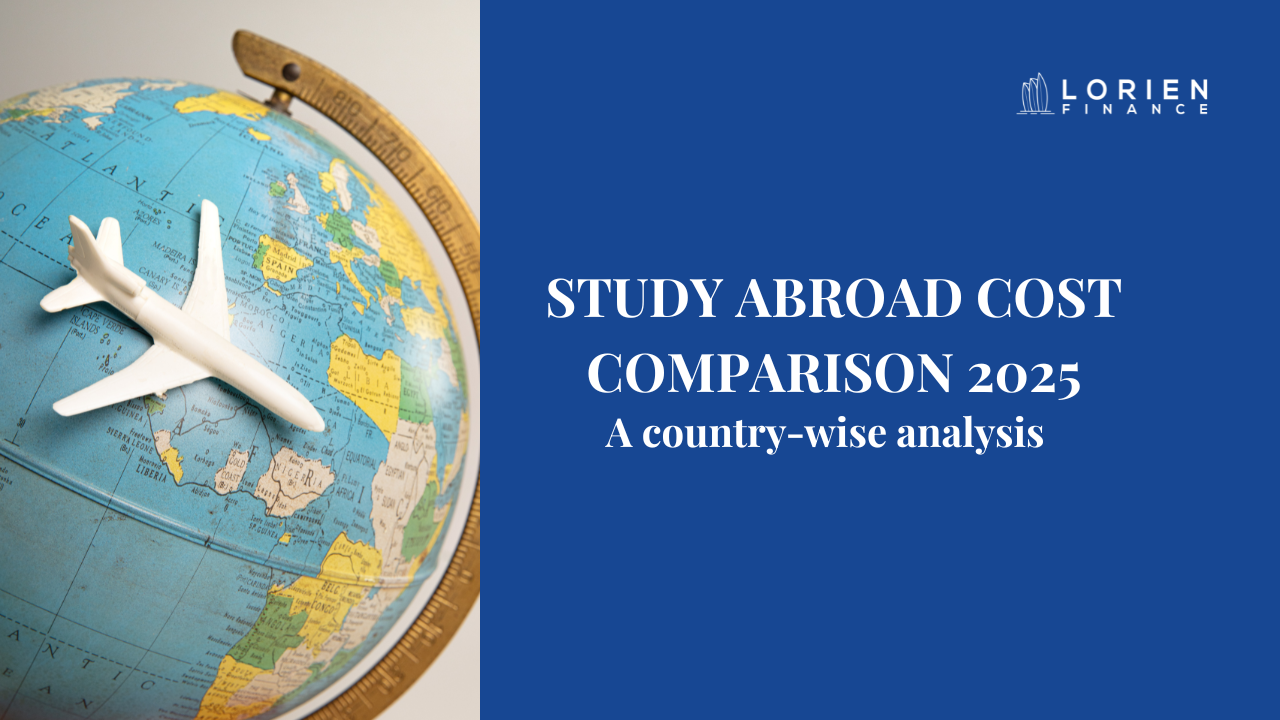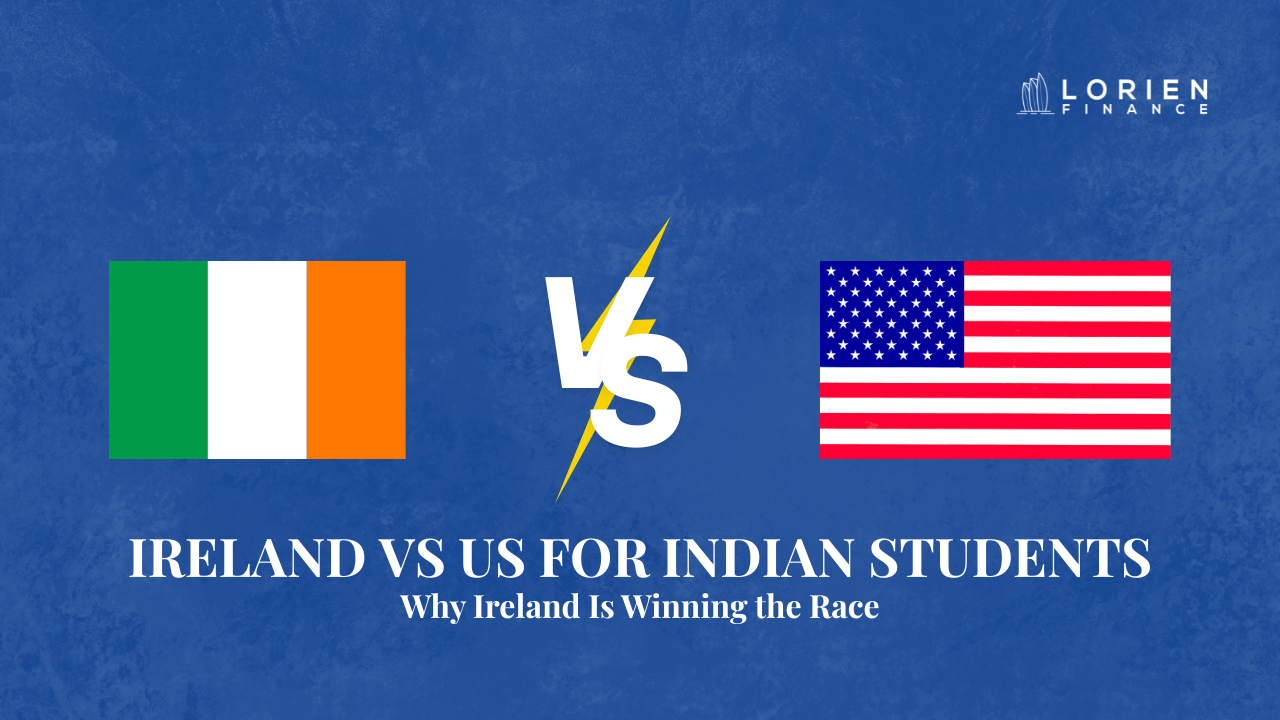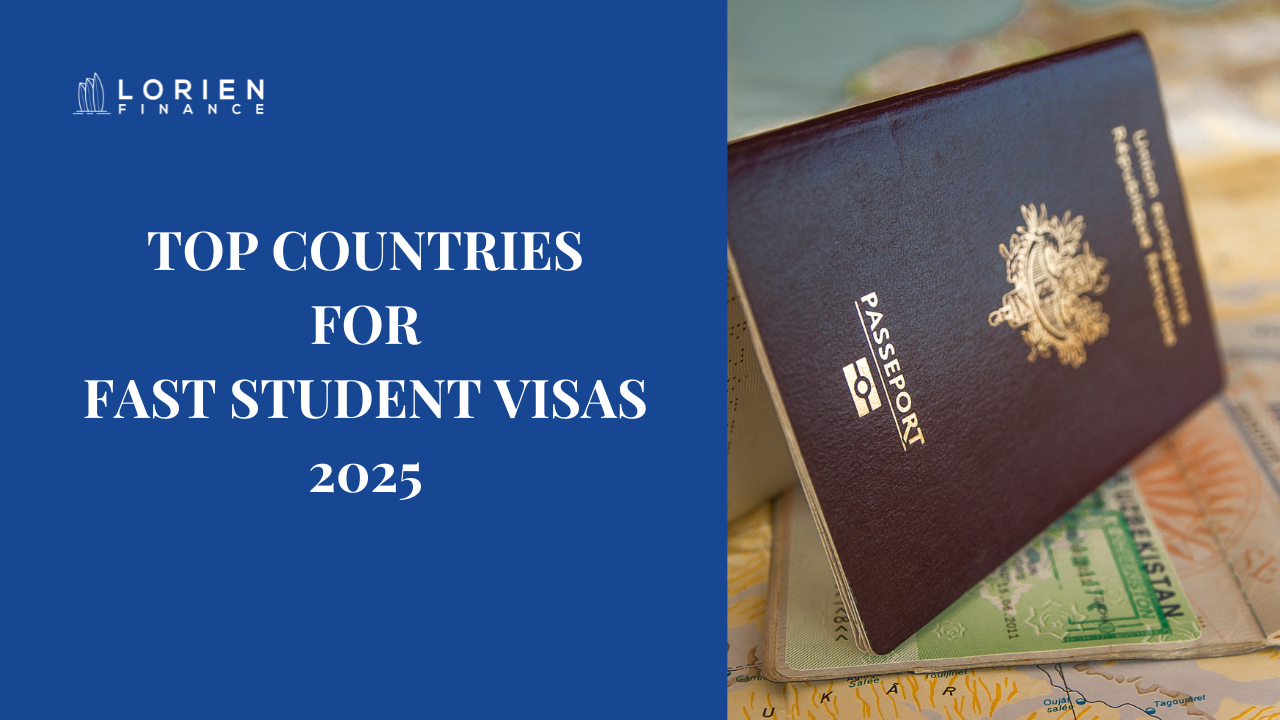Student Living Costs Abroad 2025: City-by-City Expense Guide

Packing your bags for an international education adventure comes with the thrill of new experiences, but also the sobering reality of managing student living costs abroad. Many Indian students find themselves caught off-guard by the vast differences in expenses between global education hubs, often discovering too late that their budgets fall significantly short. At Lorien Finance, we understand that getting an accurate picture of your potential expenses is crucial for making informed decisions about where to study and how to finance your education dreams. The student living costs abroad vary dramatically not just between countries, but between cities within the same country. While tuition fees often get the spotlight in financial planning discussions, daily living expenses frequently make up 40-60% of your total study abroad budget. From accommodation that can range from affordable to eye-watering, to transportation systems with vastly different pricing structures, each city presents its own unique financial landscape. This comprehensive guide breaks down the actual costs Indian students will face in popular global study destinations for the Fall 2025 intake, helping you prepare financially for this life-changing journey. Understanding the Components of Student Living Costs Abroad Before diving into specific cities, let’s break down the key expense categories that make up your monthly budget: Accommodation Options and Their Price Points Accommodation typically represents the largest chunk of student living costs abroad, often consuming 40-60% of your monthly budget. Your options include: Food and Grocery Expenses Your eating habits will significantly impact your budget. Consider: Transportation Costs Getting around your new city efficiently affects both your wallet and quality of life: Utilities and Connectivity Don’t overlook these essential services: Healthcare and Insurance Your wellbeing is non-negotiable: Miscellaneous Expenses These often-forgotten costs can derail even the most careful budget: City-by-City Breakdown of Student Living Costs Abroad North America New York City, USA Boston, USA San Francisco, USA Toronto, Canada Vancouver, Canada Europe London, UK Manchester, UK Berlin, Germany Paris, France Dublin, Ireland Asia-Pacific Singapore Sydney, Australia Melbourne, Australia Auckland, New Zealand Middle East Dubai, UAE Managing Student Living Costs Abroad: Practical Strategies Part-time Work Opportunities by Region Working while studying can significantly offset your student living costs abroad. Here’s what to expect: Remember that part-time work should supplement your finances, not be your primary funding source. Banking and Money Transfer Tips Managing your money wisely can save thousands in unnecessary fees: Financial Aid Options for Managing Student Living Costs Abroad Lorien Finance Loan Fest: Your Gateway to Affordable Education Funding Understanding student living costs abroad is just one part of financial planning. Securing affordable financing is equally crucial. Lorien Finance’s Loan Fest offers: Our Loan Fest helps you compare multiple financing options in one place, ensuring you find the most suitable and affordable loan for your specific study abroad journey. Seasonal Variations in Student Living Costs Abroad Different seasons bring different expenses: Plan your budget with these seasonal variations in mind. Financial Planning Timeline for Fall 2025 12-15 Months Before (Now) 10-12 Months Before 6-8 Months Before 3-5 Months Before 1-2 Months Before Making Smart Financial Decisions About Student Living Costs Abroad Understanding and planning for student living costs abroad is as crucial as researching academic programs. Cities like Berlin, Singapore, and Manchester offer relatively more affordable options, while New York, London, and San Francisco represent the higher end of the expense spectrum. However, cost shouldn’t be the only factor in your decision – employment opportunities, quality of education, and long-term career prospects all play important roles in determining the true value of your investment. At Lorien Finance, we’re committed to helping Indian students navigate the financial aspects of studying abroad. From providing accurate cost information to offering competitive education loan options through our Loan Fest, we’re here to support your international education journey. Remember that careful planning, realistic budgeting, and smart financial choices can make your dream of studying abroad both achievable and financially sustainable. FAQs How much emergency money should I have before moving abroad for studies? Financial advisors recommend having at least three months’ worth of living expenses as an emergency fund. For most popular study destinations, this means approximately ₹2,50,000 to ₹6,00,000 depending on the city. Can student living costs abroad be covered entirely by part-time work? No, it’s unlikely and not advisable. While part-time work can help offset some expenses (typically 20-40% of your costs), visa regulations limit working hours, and studies should remain your priority. Part-time work should supplement your primary funding source, not replace it. Is it cheaper to live on-campus or off-campus as an international student? This varies by location. In cities with high rental markets like London or New York, university accommodation may be more affordable. In cities like Berlin or Manchester, private shared housing often costs less. Factor in additional costs like utilities, internet, and transportation when comparing options. How do student loan disbursements align with when I need to pay for expenses? Most universities require tuition payment before the semester begins, while living expenses occur throughout the year. Ensure your loan disbursement schedule aligns with when major payments are due. Lorien Finance can help structure your loan disbursements to match your payment schedule. What hidden costs do most Indian students overlook when budgeting for study abroad? Common overlooked expenses include visa renewal fees, seasonal utility fluctuations, academic supplies beyond textbooks, international travel insurance, health-related costs not covered by basic insurance, and unexpected travel expenses (including emergency trips home).
Study Abroad Cost Comparison 2025: A Country-wise Analysis

Are you dreaming of studying abroad but worried about the financial burden it might bring? Understanding the exact costs of studying abroad is crucial for making informed decisions about your education. At Lorien Finance, we’ve compiled a comprehensive study abroad cost comparison for Indian students planning their overseas education journey for Fall 2025. This detailed guide breaks down expenses across popular destinations including the US, UK, Canada, Australia, Germany, France, Singapore, New Zealand, Ireland, and the UAE. The true cost of studying abroad extends beyond just tuition fees. Many students overlook hidden expenses like health insurance, travel costs, visa fees, and daily living expenses that significantly impact your budget. With the rupee’s fluctuating value against major currencies, having accurate financial information becomes even more essential for study abroad cost comparison and planning. Our experts at Lorien Finance have analysed the latest data to provide you with the most current financial picture for your study abroad dreams. Understanding the Complete Picture of Study Abroad Expenses Before diving into specific countries, let’s understand what comprises the total cost of studying abroad: Location within each country dramatically affects your overall spending. Metropolitan cities like London, New York, or Sydney carry significantly higher living costs compared to smaller towns or rural areas. When conducting your study abroad cost comparison, remember that choosing a less expensive city could save you lakhs of rupees annually. Country-wise Cost Breakdown for Indian Students (Fall 2025) United States The US remains the most expensive but also offers substantial scholarship opportunities and post-study work options. United Kingdom UK programs typically last only one year for Masters degrees, making the overall cost potentially lower than other destinations. Canada Canada offers an excellent balance of quality education and reasonable costs, plus generous post-study work options. Australia Australia’s high quality of life and strong job prospects make it attractive despite the higher costs. Germany Germany remains one of the most affordable quality study destinations due to its heavily subsidised education system. France France offers affordable education with a vibrant cultural experience, particularly for those willing to learn French. Singapore Singapore’s strategic location in Asia and world-class education system make it an excellent choice for Indian students. New Zealand New Zealand offers a relaxed lifestyle with quality education and good post-study work opportunities. Ireland Ireland’s growing tech industry and post-study stay options of 24 months make it increasingly popular among Indian students. United Arab Emirates The UAE’s tax-free income policy and proximity to India make it an attractive destination despite limited work opportunities during studies. Cost-Saving Strategies for Study Abroad Aspirants When conducting your study abroad cost comparison, consider these financial strategies: Scholarship Opportunities Education Loans The right education loan can make your study abroad dreams achievable. When comparing options, focus on: Lorien Finance’s Study Abroad Loan Fest Looking for the best education loan for your study abroad journey? Join Lorien Finance’s Loan Fest, where we offer: Our Loan Fest simplifies your study abroad cost comparison by bringing multiple lenders together, helping you find the most affordable financing option tailored to your specific needs. Work-Study Opportunities Cost-Effective Universities Consider universities that offer: Return on Investment Analysis by Country Your study abroad cost comparison should include potential returns: United States United Kingdom Canada Australia Germany France Singapore New Zealand Ireland United Arab Emirates Making Your Decision: Financial Planning Timeline for Fall 2025 To ensure you’re financially prepared for your Fall 2025 study abroad journey: 12-15 months before: 10-12 months before: 8-10 months before: 6-8 months before: 3-5 months before (Now): Study Abroad Cost Comparison: Country-wise Summary Country Annual Tuition (₹) Annual Living Costs (₹) Health Insurance (₹) Visa Fee (₹) Total Annual Cost (₹) Work Hours Allowed Post-Study Work USA 25L – 50L 12L – 20L 1L – 1.5L 30K 38L – 66.5L 20 hrs/week 1-3 years UK 15L – 35L 10L – 15L 50K 40K 25.9L – 50.9L 20 hrs/week 2 years Canada 12L – 30L 8L – 12L 40K – 60K 12K 20.5L – 37.7L 20 hrs/week Up to 3 years Australia 18L – 35L 9L – 14L 45K 45K 27.9L – 49.9L 48 hrs/fortnight 2-4 years Germany Free – 15L 7L – 10L 80K 6K 8.3L – 26.1L 120 days/year 18 months France 2.5L – 20L 7.5L – 12L 25K 8K 10.3L – 32.8L 964 hrs/year 1-2 years Singapore 15L – 30L 8L – 12L 20K 2K 23.2L – 37.2L 16 hrs/week 1-3 years New Zealand 16L – 30L 7.5L – 12L 35K 25K 24.1L – 37.6L 20 hrs/week 1-3 years Ireland 12L – 30L 8L – 12L 45K 6K 20.5L – 37.5L 20 hrs/week 2 years UAE 10L – 25L 8L – 15L 30K 15K 18.5L – 40.5L Varies Varies Conducting a thorough study abroad cost comparison is essential before embarking on your international education journey. While Germany and France offer the most affordable education options, countries like the US, UK, and Australia provide potentially higher returns on investment through better job opportunities and higher starting salaries. At Lorien Finance, we understand that financing your study abroad dream is one of the biggest challenges Indian students face. Our platform connects you with 17+ global and Indian lenders, helping you secure the best possible education loan terms for your unique situation. Don’t forget to join our Loan Fest to access interest rates starting at just 3.39% and exciting rewards like MacBooks, iPhones, and travel kits worth ₹20,000. FAQs Can I work part-time during my studies to cover expenses? Yes, most countries allow international students to work part-time during their studies. However, the number of permitted hours varies (typically 20 hours/week during term time) and shouldn’t be considered your primary funding source. Is it cheaper to study in Europe than in the US or UK? Generally, yes. Countries like Germany and France offer significantly lower tuition fees at public universities. However, you may need to learn the local language to access all programs, especially at the undergraduate level. How do education loans in India compare to international education loans? Indian banks typically
Ireland vs US for Indian Students: Why Ireland Is Winning the Race

The landscape of international education is shifting dramatically as more Indian students weigh the benefits of Ireland vs US for Indian students when planning their academic futures. Recent trends show that while the United States has traditionally been the top choice, Ireland is rapidly gaining popularity for Fall 2025 intakes. This emerging shift in the Ireland vs US equation stems from Ireland’s streamlined visa processes, generous post-study work rights, affordable tuition fees, and excellent employment prospects in a growing economy. As specialists in education financing, Lorien Finance has observed a significant surge in loan applications for programs in Ireland compared to the US. Our data indicates that when evaluating Ireland vs US for Indian students, many are now favouring Ireland as a cost-effective alternative that doesn’t compromise on quality education or career opportunities. Irish universities offer globally recognized degrees while providing a welcoming environment for international students seeking quality education with better long-term prospects. Ireland vs US for Indian Students: The 2025 Shift in Preferences The traditional flow of Indian students to American universities is experiencing a notable shift. While the US remains a popular destination, enrolment in Irish institutions has grown by over 50% in recent years, while US enrolments have seen a relative slowdown. Here’s why the Ireland vs US comparison increasingly favours Ireland: Post-Study Work Visa Comparison When comparing Ireland vs US for Indian students, Ireland clearly wins with its two-year stay-back visa after completing a master’s degree, allowing sufficient time to secure permanent employment. This compares favourably to the US system, which offers only one year of OPT for non-STEM courses and relies on an uncertain H-1B visa lottery process. Education Cost: Ireland vs US Most Irish master’s programs are completed in just one year. With average tuition fees around €25,000 and annual living expenses approximately €15,000, studying in Ireland is substantially more affordable than American universities, where total costs often exceed ₹75 lakhs for similar programs. This cost difference makes the Ireland vs US decision financially significant. Return on Investment Timeline In the Ireland vs US comparison for ROI, graduates from Irish universities enter a robust job market featuring global companies like Google, Apple, Meta, Pfizer, and Accenture. Starting salaries typically range from €35,000 to €45,000 annually, enabling faster loan repayment compared to many other study destinations. Visa Process: Ireland vs USA The visa approval process is another area where the Ireland vs US for Indian students comparison favours Ireland. The Irish system is straightforward with fewer backlogs and transparent requirements. Additionally, students can work part-time during term time and full-time during holidays, helping offset living expenses. Cultural and Academic Environment As one of the few English-speaking countries in the European Union, Ireland provides both language comfort and access to the broader European job market. When evaluating Ireland vs US study options, Irish degrees’ recognition throughout the European Higher Education Area adds significant value. Top Programs in the Ireland vs US Education Markets (2025) Based on application trends and employment opportunities, these are the most sought-after courses when comparing Ireland vs US for Indian students: Technology and Data Sciences Ireland’s status as a global tech hub makes it competitive with Silicon Valley for those pursuing master’s degrees in Data Science, Artificial Intelligence, or Cybersecurity. These qualifications are highly valued by major tech companies with European headquarters in Dublin. Business and Management Studies Both countries offer strong business programs, but the Ireland vs US comparison often favors Ireland for its one-year duration MBA programs with strong connections to European markets and multinational corporations. Pharmaceutical Sciences and Biotechnology As Europe’s second-largest pharmaceutical exporter, Ireland offers exceptional opportunities for biotech graduates that rival those in the US, often with faster entry into the workforce. Engineering Specialisations Infrastructure development and green energy initiatives have created strong demand for engineering graduates across mechanical, civil, and electronic disciplines throughout Ireland, making it comparable to opportunities in the American market. Healthcare Management and Policy Post-pandemic expansion of health systems has increased demand for healthcare managers and policy professionals in both countries, with Ireland offering faster qualification and entry into the field. How Lorien Finance Supports Your Decision in the Ireland vs US Debate Lorien Finance specialises in making the process of securing education loans straightforward and efficient regardless of whether you choose Ireland or the US. Our comprehensive services for both destinations include: Documentation Required for Education Loans: Ireland vs US When preparing to study abroad, you’ll need these documents for your loan application at Lorien Finance: Expert Analysis: Ireland vs US for Indian Students in 2025 When comparing Ireland vs US for Indian students seeking quality education and future prospects, Ireland emerges as the smarter choice for 2025. With its balanced combination of academic excellence, post-graduation opportunities, and affordability, Ireland offers Indian students significant advantages. Lorien Finance is committed to helping you navigate the financial aspects of your study abroad journey, whether you choose Ireland or the USA. Our specialised education loan services ensure you can make your decision based on what’s best for your academic and career goals, not just financial constraints. FAQs Which country offers better post-study work opportunities? When comparing Ireland vs US for Indian students, Ireland provides a more certain path with its two-year stay-back visa after graduation. The USA offers only one year for non-STEM graduates and requires navigating the competitive H-1B lottery system for long-term work authorization. Do Indian students need to take IELTS for both Ireland and USA? Yes, both destinations typically require English proficiency tests like IELTS or TOEFL. However, some Irish universities may waive this requirement if your previous education was conducted entirely in English, which is less common among US institutions. Which country has a higher visa approval rate for Indian students? While approval rates vary, the Irish student visa process is generally considered more straightforward and predictable than the US F-1 visa process. In the Ireland vs USA comparison, Ireland typically has fewer visa rejections for qualified applicants. Can I work while studying in Ireland vs USA? Both countries allow international students to work part-time during studies. Ireland permits 20 hours per week during term time and 40 hours during holidays, similar to
Quick Loans for Studying Abroad for Fall ’25

The acceptance letter has arrived, and your Fall 2025 study abroad journey is becoming real. Amid the excitement, however, looms the pressing question of financing this life-changing opportunity. With mid-May already upon us, the window for arranging your education finances is narrowing by the day. At Lorien Finance, we’ve seen countless Indian students scramble during these critical weeks, unaware that quick loans for studying abroad can make the difference between stepping onto campus this fall or deferring their dreams for another year. Time waits for no student, especially when university deposit deadlines approach, visa appointment slots grow scarce, and affordable housing options disappear. Many bright minds don’t realize that delayed financing can jeopardise even the most prestigious admission offer. This comprehensive guide walks you through securing quick loans for studying abroad before Fall ’25 deadlines slip away, ensuring your international education plans proceed without costly delays or complications. May 2025 Timeline Check: How Far are You from Quick Loans for Studying Abroad By mid-May, successful Fall ’25 admits should have completed or be finalising these crucial steps: If you’re behind on financial arrangements, there’s still hope – but immediate action is essential. The countdown between admission acceptance and orientation day shrinks rapidly, with your financial documentation serving as the critical bridge between admission and enrolment. The Hidden Dangers of Traditional Loan Processes for Fall ’25 Admits Conventional education loan journeys often span 6-8 weeks from application to disbursement – a timeline that creates serious complications for Fall ’25 admits at this stage. Traditional financing paths typically involve: These requirements create bottlenecks that directly impact: Students from smaller Indian cities face even greater challenges when lenders require physical verification of properties or documents that need multiple family members present. Review our analysis of common education loan hurdles for international students to identify potential roadblocks in your financing journey. Quick Loans for Studying Abroad: The Time-Sensitive Solution When the clock is ticking on your Fall ’25 admission, specialised quick loans for studying abroad become invaluable. These streamlined financial solutions offer: Lorien Finance has developed strategic partnerships with financial institutions that understand the unique time pressures facing international students. Visa Success: How Quick Loans for Studying Abroad Impact Approval Chances Visa officers scrutinise financial arrangements for both adequacy and legitimacy. Hastily assembled financial documentation raises red flags that frequently lead to visa rejections. With properly arranged quick loans for studying abroad, you demonstrate: Current visa appointment wait times for top study destinations range from 30-45 days, with some consulates showing availability only in late July or early August. This leaves minimal room for financing delays. Our comprehensive visa interview preparation guide offers specific advice on effectively presenting education loan documentation during your interview. The Lorien Finance Expedited Process: Speed Without Compromise Recognising the urgent needs of Fall ’25 admits, Lorien Finance has engineered an accelerated process specifically for time-sensitive applications: This accelerated approach has helped hundreds of Indian students progress from application to approval in record time, often cutting standard processing time by 50-60%. The Lorien Finance Study Abroad Loan Fest: Your Fast-Track Financing Opportunity Mark your calendars! The upcoming Lorien Finance Quick Loan Fest brings together leading providers of quick loans for studying abroad under one virtual roof. This exclusive event allows Fall ’25 admits to: The Study Abroad Loan Fest represents a golden opportunity to resolve your financing challenges efficiently while potentially saving thousands of dollars over the life of your loan. Registration details for this time-sensitive event will be announced soon through our social media channels and email newsletter. Emergency Timeline Action Plan: When Every Day Counts For students facing critically tight deadlines, we recommend this emergency action plan: I Week: Documentation and Application Sprint II Week: Rapid Approval and University Documentation III Week: Finalisation and Pre-Departure Preparation Emergency processing may involve priority handling fees, but when weighed against the potential cost of deferring admission or losing your opportunity entirely, these fees represent a worthwhile investment in securing your academic future. Success Stories: From Financial Urgency to Timely Arrivals Numerous students have successfully navigated tight timelines with Lorien Finance’s guidance: “With only three weeks before my I-20 deadline at NYU, I feared my admission was in jeopardy. Lorien Finance secured my quick loan for studying abroad in just 9 business days, allowing me to complete all documentation with time to spare.” – Arjun M., NYU Tandon School of Engineering. “As a student from Jaipur, traditional banks wanted me to make multiple trips to Delhi for processing. Lorien Finance’s digital process secured my financing entirely online, saving crucial weeks during my peak preparation time.” – Sneha K., University of Toronto These success stories share a common thread: proactive students who recognized the urgency of their situation and leveraged specialized services designed specifically for international education financing under tight deadlines. Don’t Let Financing Delays Derail Your Fall ’25 Study Abroad Journey Your acceptance letter represents years of preparation and achievement. Don’t let financial logistics derail your international education dreams when specialised quick loans for studying abroad can bridge the gap between acceptance and enrolment. Lorien Finance stands ready to guide you through this time-sensitive process with expertise developed through helping thousands of Indian students realise their international education goals. Our dedicated advisors understand both the financial requirements and the emotional investment in your journey. Take the first step today by scheduling your urgent financing consultation. Remember, in the final countdown to Fall ’25 enrolment, proactive financial planning makes all the difference between celebration and regret. FAQs Can I begin my visa application process while my quick loan is still being processed? Yes, many students schedule visa appointments based on provisional loan approval documents. Lorien Finance provides specific documentation designed to satisfy visa interview requirements even when final loan processing is still underway. My university deposit deadline is next week, but my loan won’t be processed by then. What are my options? Lorien Finance offers several strategic solutions including deposit bridge financing, university deadline extension requests with evidence of loan processing, and
Top Countries for Fast Student Visas 2025

Studying abroad is an exciting and life-changing experience, but the visa process can often be overwhelming. To help you navigate this, we’ve put together a list of top countries for fast student visas 2025. Whether you’re looking for academic excellence, work opportunities, or a smooth visa experience, these countries have you covered. United Kingdom Australia Ireland Italy Poland Spain United Arab Emirates Tips for a Smooth Visa Application What is the Study Abroad Loan Fest? Planning to study in these top countries with fast student visas 2025? Lorien Finance’s Study Abroad Loan Fest is designed to help you stay ahead. This limited-time initiative connects you with India’s top education loan providers, ensuring you get your loan sanctioned quickly—so your visa application process doesn’t face delays. How Lorien Helps: Choosing the right study abroad destination is not only about the quality of education but also about the ease of obtaining a student visa and ensuring a smooth transition. Top countries with fast student visas 2025 like the UK, Australia, Ireland, Italy, Poland, Spain, and the UAE offer excellent student visa processes and post-study opportunities, making them ideal destinations for Indian students. By understanding the visa requirements and starting your preparations early, you can set yourself up for a successful and rewarding academic journey abroad. FAQs Are there post-study work options in these countries? Yes, several of the countries mentioned offer post-study work visas, like the UK, Ireland and Australia have a two-year post-study work visa through the graduate route, in Poland, students can stay for up to one year after graduation to seek work, and the UAE is offering increasing opportunities for skilled graduates to stay and work post-study. Can international students work while studying in these countries? Yes, most of these countries allow students to work part-time while studying, like students can work 40 hours per fortnight during term time in Australia, 20 hours per week in the UK and Ireland, while Poland and the UAE allow students to work part-time. What are the common reasons for student visa rejections? Some common reasons for visa rejections include incomplete or incorrect documentation, failure to prove financial stability, lack of a clear study plan or purpose, previous visa violations or immigration history or Inability to demonstrate ties to your home country, which could suggest you may overstay your visa. Do I need to prove financial support for my student visa application? Yes, most countries require proof that you can financially support yourself during your stay. This could include bank statements, scholarship letters, or a financial sponsor. The exact requirements vary by country, so it’s important to confirm with the embassy or consulate. Can I switch from a student visa to a work visa after graduation? In some countries, such as the UK, Australia, and Ireland, you can apply for a work visa after completing your studies, especially if you have a job offer. Be sure to check the specific country’s post-study visa options and requirements.
No Cosigner Study Abroad Loan Application Process

Getting into your dream university abroad is just the beginning. The next big milestone? Securing your education loan. If you’re an Indian student applying for a no cosigner study abroad loan, the process can seem complex—but it doesn’t have to be. This blog offers a step-by-step walkthrough of the no cosigner study abroad loan application process for Indian students. Whether you’re applying to the US, UK, Canada, or Europe, lenders like MPOWER Financing, Prodigy Finance, and Earnest have made it possible to get loans based on your academic merit and future potential—not your financial background. Why You Need a Process Checklist On platforms like Quora and Reddit, we constantly see questions like: “What documents do I need for a Prodigy loan?” “How early should I apply for MPOWER?” “What’s the next step after getting conditional approval?” That’s exactly why having a clear application roadmap matters. At Lorien Finance, we help Indian students apply, track, and succeed with their no cosigner study abroad loan applications—and we’ve compiled everything you need to know right here. Step 1: Research and Choose the Right Lender Before filling out any form, make sure your university, course, and country are supported by the lender. Step 2: Prepare the Required Documents Unlike Indian banks, these lenders require no collateral or income proofs, but you’ll still need to provide: Pro Tip: Ensure your documents match in name, spelling, and dates. Inconsistencies cause delays. Step 3: Fill Out the Online Application Each lender has its own digital application process, but to save time you can apply with Lorien Finance. Simply fill one application that can help you compare your loan from multiple lenders. If you still wish to apply with these lenders individually: Step 4: Wait for Conditional Approval If your initial profile is strong, you’ll get a conditional offer within 3–7 working days. This will include: Note: Conditional approval is not your final loan—it means the lender is ready to proceed pending full verification. Step 5: Upload Final Documents & Accept the Offer Once conditionally approved: At this stage, your loan sanction letter is generated—this is what you can use for your visa appointment. Step 6: Loan Disbursement and Post-Approval Support Once your university confirms your enrollment: You can begin voluntary interest payments during study to reduce overall burden. What is the Study Abroad Loan Fest? Lorien Finance’s limited-time initiative connects you directly with top education loan providers, offering personalised expert guidance for faster and smarter loan approvals. How Lorien Helps: How Loan Fest Makes the Process Easier Applying alone can be stressful—but during Loan Fest, Lorien Finance makes it easier by: Yes, applying for a no cosigner study abroad loan takes effort—but it’s completely doable, even if you’re navigating it solo. Thousands of Indian students have walked this path, and we’re proud to have helped many of them get there faster, smoother, and with confidence. At Lorien, we’re not just here for the loan—we’re here for your entire journey. From your admit letter to your first day on campus, you’ll never walk alone. FAQs Can I apply for a no cosigner study abroad loan before my visa? Yes. In fact, you should apply early so your sanction letter is ready before your visa interview. What is conditional approval? Is it final? Conditional approval means the lender is ready to give you a loan, but only after verifying final documents like your visa or admission confirmation. Can I apply to multiple lenders at once? Yes! Lorien helps you do this easily and helps you pick the best offer once you have them all. What if I’m missing a document (like GRE)? Some lenders may allow alternatives or waivers, especially if your university doesn’t mandate the test. Talk to an advisor for clarification. Do I need to repay during my course? MPOWER usually requires small monthly interest payments during study. Prodigy and Earnest offer full deferment or customized plans.
No Cosigner Education Loan by Country for Indian Students

Every country has its own rules when it comes to student loans, visa requirements, and funding approvals. For Indian students dreaming of global education, navigating this financial maze can be daunting—especially if you’re applying for a no cosigner education loan. The good news? Students are increasingly getting approved without needing a guarantor or collateral, even for top study-abroad destinations like the US, Canada, UK, and Europe. But the lender you choose—and the terms you get—will depend a lot on where you’re going. Let’s breaks down the best no cosigner education loan options by country, what to expect in each destination, and how to find the right lender for your specific profile. At Lorien Finance, we’re helping students secure the right funding for every country—and we’ll show you how. Why Country-Specific Knowledge Matters The truth is, every country has different requirements when it comes to loan acceptability, visa funding proof, and repayment expectations. During India’s biggest Study Abroad Loan Fest by Lorien Finance, we help students compare lender options based on both university and destination country, making it easier to find what fits. USA: The Most Flexible for No Cosigner Education Loan The US remains the most favorable country for Indian students applying for no cosigner education loan. Best Choice: If you’re going to a US university, you have multiple no-cosigner lenders to choose from. Use Lorien to compare interest rates and grace periods across lenders. Canada: Limited, But Growing Loan Options Canada is becoming increasingly popular, especially for STEM and business programs. Pro Tip: Combine a no-cosigner loan for tuition with personal funds or scholarships for GIC requirement. UK: Ideal for PG Students via Prodigy Finance With two-year post-study work visas and top-ranked universities, the UK is a favorite for Indian students—and Prodigy Finance is the go-to lender. Best Fit: Students pursuing business, engineering, public policy or health-related PG degrees. Germany & Europe: Mixed Options, But Still Possible Germany offers low tuition, but living expenses still need funding. Many Indian students ask: “Can I get a loan without collateral for Germany?” Budget Tip: If tuition is free (e.g., in public universities), take a loan just for living expenses, which many lenders will allow. Australia & Other Countries: Limited No Cosigner Loans, Check Eligibility Australia is in high demand—but no cosigner loan options are fewer. Recommendation: Check your program on the lender’s portal or consult Lorien before applying. How Loan Fest Helps You Choose Based on Country Lorien’s Study Abroad Loan Fest is India’s only comparison event focused entirely on education loans—especially for students without co-signers or collateral. Here’s what you can do: Country Top Lender(s) UG/PG Visa Acceptance Notes USA MPOWER, Prodigy, Earnest UG + PG Yes Most coverage + flexible terms Canada MPOWER UG + PG Yes (with GIC) Limited lenders, strong PG focus UK Prodigy PG only Yes High acceptance for MBAs, MS Germany Prodigy PG only Varies Mostly for living expenses Australia Prodigy PG only Yes Must confirm school coverage Your dream may take you to Boston or Berlin, Toronto or Sydney. And we’re here to make sure funding never stops you. With the right lender and the right loan, your destination is closer than you think. At Lorien Finance, we guide you through country-specific approvals, lender requirements, and visa rules—so you can apply with clarity and confidence. Wherever you’re going, go prepared. FAQs Can I get a no cosigner loan for a German university? Yes, but options are limited. Prodigy Finance supports a few PG programs. Lorien can help check eligibility. Will my loan sanction letter work for visa interviews? Yes—letters from MPOWER, Prodigy, and Earnest are accepted by US, UK, Canada, and most European embassies. Which country has the most no cosigner loan options? The USA leads with multiple lenders offering full coverage for UG and PG programs. Can I get a loan for living expenses only? Yes. If your tuition is covered (e.g., through scholarships or free programs in Germany), some lenders will approve partial loans for living costs. Does the country affect loan interest rates? Not directly, but repayment currency (USD, EUR) and local job prospects can impact your effective burden. Always compare before choosing.
7 Tips to Get Your No Cosigner Education Loan Approved

You’ve got your admit. You’ve got the determination. But there’s one hurdle left—securing the loan. If you’re applying for a no cosigner education loan, you might have already heard that the approval process is “tough” or “uncertain.” And it’s true—lenders take a bigger risk when there’s no co-signer or collateral involved. But here’s the good news: with the right strategy, thousands of Indian students are getting approved every year. And you can be one of them. This blog outlines 7 actionable tips to boost your chances of no cosigner education loan approval—even if you don’t have a co-signer or security. We’ve pulled this advice not just from theory, but from real student experiences shared on Reddit, Quora, and the Lorien Finance community. Why Getting a No Cosigner Loan Feels Harder (But Isn’t Impossible) Indian students aspiring to study abroad often ask: “MPOWER rejected me—what did I do wrong?” “Got conditional approval from Prodigy, now what?” “Is there a trick to getting no guarantor loans approved?” Truth is, there’s no trick—but there is a method. Lenders like MPOWER Financing, Prodigy Finance, and Earnest are betting on your future potential, not your financial past. That means everything from your university admit to your SOP matters for your no cosigner education loan. Tip 1: Choose the Right Lender Based on Your Profile Not every lender is for every student. Tip 2: Strengthen Your Academic Profile Your GPA, test scores (GRE/GMAT/IELTS), and even your undergrad performance matter. These metrics tell lenders: This student is likely to succeed—and repay. Tip 3: Craft a Clear, Career-Oriented SOP Lenders like Prodigy and Earnest review your statement of purpose or loan essay. Use this to: Example: “Post-MS in Data Science, I aim to work at tech firms like Google, with average entry-level salaries around $100K, based on my university’s employment report.” Tip 4: Upload Complete, Accurate Documents One of the top reasons for rejection? Incomplete or inconsistent documentation. Make sure to upload: If anything is missing or mismatched (e.g., name spelling across documents), clarify with a letter. Tip 5: Ask for the Right Loan Amount Lenders prefer students who show practical budgeting. Don’t ask for the max just because you can. Instead: This shows responsibility and increases your approval odds. Tip 6: Apply Early—Don’t Wait for the Visa Stage The earlier you apply, the better. Why? Most successful students apply within 1–2 weeks of receiving their admit. Tip 7: Work with a Platform That Has Experience At Lorien, we’ve helped hundreds of students apply for study abroad loans—many without co-signers or collateral. Our advisors: Don’t let the absence of a co-signer define your journey. With the right prep and support, you can secure a no cosigner education loan and chase your dream university abroad. It’s not just about funding—it’s about believing in your potential, and getting lenders to believe in it too. At Lorien Finance, we’re here to help you every step of the way. FAQs How long does it take to get a no cosigner loan approved? Usually 7–14 working days if your documents are in order. Conditional approvals can come sooner. Can I apply to multiple lenders at the same time? Yes. In fact, it’s recommended. Lorien helps you apply to multiple no cosigner lenders with a single profile. Will I need to make payments while studying? Depends on the lender. MPOWER requires interest-only payments during study. Prodigy allows full deferment for some courses. Earnest offers custom repayment options. What kind of SOP do lenders expect? They want to see your goals, job market awareness, and a repayment plan. It’s not a university SOP—it’s more like a career pitch. Can a weak GPA be compensated with work experience? Yes, especially for MBA or PG courses. A strong resume and SOP can balance out lower academic scores.
MPOWER vs Prodigy vs Earnest: Best No Cosigner Loan

When your dreams are big, your loan options should match. But if you’re an Indian student without a financial guarantor or property to pledge, choosing the right education loan can feel overwhelming. That’s where no cosigner loans step in—but with multiple lenders like MPOWER Financing, Prodigy Finance, and Earnest, how do you pick the best no cosigner loan that fits your journey? We get it-your education is a life-changing investment. So in this blog, we compare these three top global lenders on everything from eligibility and interest rates to repayment and visa support. If you’re looking for the best no cosigner loan for Indian students, you’re in the right place. Why This Comparison Matters Indian students often ask: “Which is better: MPOWER or Prodigy for MS in the US?”“Can I apply to both Earnest and MPOWER?”“Which lender gives faster sanction without a cosigner?” These questions highlight a common pain point—lack of clear comparison. That’s why Lorien Finance is running India’s biggest Study Abroad Loan Fest, where students can compare rates, terms, and offers from multiple lenders—side-by-side. And yes, we help you apply to more than one lender too. MPOWER vs Prodigy vs Earnest: A Detailed Breakdown Here’s a point-by-point comparison of the best no cosigner loans for Indian students heading abroad in 2025. Countries & Universities Covered Lender Countries Covered University Eligibility MPOWER USA, Canada 400+ partner universities Prodigy USA, UK, EU, Canada, more 850+ grad programs worldwide Earnest USA only Most accredited U.S. institutions Verdict: Prodigy wins on country coverage, especially for students heading to the UK or Europe. MPOWER is great for Canada, while Earnest is strictly US-focused. Loan Amount & Disbursement Note: MPOWER and Prodigy also allow partial disbursements for living costs, making budgeting easier for international students. Interest Rates & Fees Lender Interest Type Typical APR Fees MPOWER Fixed ~12.49–13.99% 6.5% of Disbursed Amount Prodigy Variable 11%–14% (incl. margin) $500 + 4% of loan amount Earnest Fixed/Var 9%–13% (profile-based) No processing fees Verdict: Earnest often offers lower interest rates and no fees, but approval depends heavily on academic strength. Prodigy gives flexible options, especially for top-tier grad schools. MPOWER provides fixed rates but includes a fee—worth it for students needing a predictable EMI. Eligibility Requirements Tip: Students applying to PG programs in the US may be eligible for all three lenders to secure the best no cosigner loan. Visa & Career Support “I got my visa approved using my MPOWER sanction letter + GIC for Canada,” shared a student recently.“Prodigy’s loan letter worked for my UK Tier-4 visa,” said another. Processing Time & Repayment Flexibility All three offer flexible prepayment options with no penalties. Which Lender Is Right for You? Scenario Best Lender Studying in Canada or USA with no co-signer MPOWER Financing Applying to UK, EU, or top MBA/MS abroad Prodigy Finance Strong U.S. admit with a stellar academic profile Earnest Not sure? During the Study Abroad Loan Fest, Lorien helps you apply to multiple lenders with one profile—maximizing your chances of approval and getting the best no cosigner loan for your abroad education. Each student is different. That’s why there’s no “one-size-fits-all” answer. Whether you choose MPOWER’s fixed rates, Prodigy’s flexible coverage, or Earnest’s low-fee model—what matters is that your journey doesn’t stop and you find the best no cosigner loan for your education abroad. At Lorien Finance, we help you figure out what works best—because we believe no dream should be put on hold for paperwork or property. Compare, apply, and fly. We’ve got your back. FAQs Can I apply to more than one no cosigner lender at the same time?Yes. In fact, Lorien encourages this during Loan Fest so you can compare offers and pick the best terms. Which lender is faster in disbursing the loan?Earnest is known for fast processing, often under 5 days. MPOWER and Prodigy typically take 7–10 days depending on documentation. What if I don’t get a loan from any of these?Lorien can help you explore other options, including NBFCs, scholarships, or partial funding combinations. Is there a penalty if I repay early?No, none of the three lenders charge prepayment penalties.Can I use the loan sanction letter for visa interviews?Yes. All three lenders issue sanction letters valid for visa applications for countries like the US, UK, and Canada.
No Collateral Education Loans for Indian Students: Pros and Cons

Every year, thousands of Indian students dream of studying abroad—but one major hurdle stops many in their tracks: financing. The biggest barrier? Collateral. Most traditional Indian banks require property or liquid security to issue a study abroad loan. But what if you don’t have that? Are your dreams over? Absolutely not. That’s where no collateral education loans for Indian students come in—offering students a chance to fund their education based on potential, not possessions. And at Lorien Finance, we’ve seen firsthand how these loans are transforming futures. What Are No Collateral Education Loans? A no collateral education loan (also known as an unsecured education loan) doesn’t require students or their families to pledge any property or assets. Almost all lenders—including Indian banks and NBFCs—offer unsecured loans today. However, here’s the catch: when there’s no collateral, interest rates are significantly higher, and the approval process is far more selective. The real game-changer comes when a lender offers no collateral and no cosigner loans—which is still rare. That’s where MPOWER Financing, Prodigy Finance, and Earnest stand out. These global lenders give eligible Indian students access to education funding based purely on academic potential, admission offer, and future income prospects—without requiring family backing or property. The Growing Trend: Why More Students Are Choosing No Collateral Loans Almost all students aspiring to study abroad Google this question multiple times “how to get an education loan without collateral or co-signer”. Many students shared struggles such as: “My family doesn’t own a home. No Indian bank will give me a loan.” “I have an admit from a top US university but can’t get funding because I don’t have property to pledge.” In fact, a recent Google Trends report showed a 34% YoY increase in searches for study abroad loans without collateral from Tier-2 and Tier-3 cities in India. This rise in demand is being met by lenders who believe in the future value of a student’s education. But is this type of loan right for everyone? Let’s break it down. Pros of No Collateral Education Loans The biggest advantage is clear—you don’t need to own a house, land, or have savings in the form of FDs to apply. This makes global education accessible to first-generation learners and students from modest backgrounds. These loans are assessed based on your university admit, academic performance, and future earning potential. This is perfect for high-potential students who may not have strong financial backing but do have bright futures. Many of these loans cover more than just tuition—they also cover living expenses, insurance, travel, and materials. This means you don’t have to scramble for partial funding. Unlike traditional banks that take weeks and multiple physical visits, lenders like MPOWER, Prodigy, and Earnest offer fast, paperless approvals. Some approvals are issued in under a week. All three lenders issue loan sanction letters valid for visa interviews, a major plus when applying to the U.S., Canada, or the UK. Cons of No Collateral Education Loans Because these are unsecured loans, the interest rates are typically 2–4% higher than secured loans. However, some lenders offer interest rate discounts for on-time payments and autopay enrollment. For example, MPOWER has a fixed interest rate of \~12–13% APR, with 0.5–1.5% discount options over time. Lenders often work with pre-approved universities or courses. If your admit isn’t on their list, you may not be eligible. Many no collateral lenders like Prodigy Finance only fund postgraduate (PG) programs, leaving undergraduate students with fewer options (except MPOWER, which funds both UG and PG). Loans from international lenders are disbursed and repaid in USD, EUR, or CAD. If you return to India post-graduation, exchange rate fluctuations can impact your repayment. Some lenders (like MPOWER) charge a 5% origination fee, which is deducted upfront. While this isn’t unusual, students should budget accordingly. Should You Choose a No Collateral Loan? Here’s the bottom line—if you don’t have collateral or a co-signer, a no collateral loan might be your only path forward. Yes, interest rates are higher, but so is the opportunity cost of not attending your dream university. What matters is getting the right fit. That’s where Lorien’s Study Abroad Loan Fest comes in. We bring all top lenders to the table—compare their rates, benefits, and timelines in one place. Your education is one of the best investments you’ll ever make. We know the loan process can feel overwhelming—but we’ve got your back. At Lorien Finance, we help you navigate your options, compare no collateral education loans, and apply with confidence. Whether you’re just starting out or stuck mid-way—we’re here to get you to the finish line. FAQs Is it safe to take a no collateral education loan from international lenders? Yes, if you’re applying through reputable lenders like MPOWER, Prodigy, or Earnest, the process is secure and legally regulated. How do I know if my university is eligible? Check each lender’s website or use Lorien’s free eligibility tool to see if your program is on their approved list. What happens if I return to India after studies? You’ll still repay in the loan currency (e.g., USD), so plan finances accordingly. Many students begin repayment once employed abroad to manage exchange rates better. Which is better: no collateral or with collateral loan? If you have property and want a lower interest rate, go with a secured loan. If not, no collateral loans are a strong alternative based on merit. Can I apply before my visa interview? Absolutely. A loan sanction letter from a lender is accepted as proof of funds during visa interviews.
